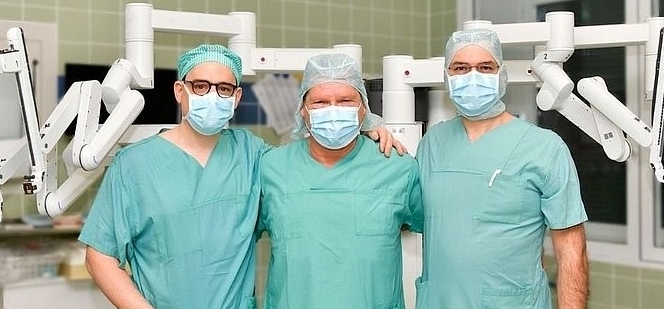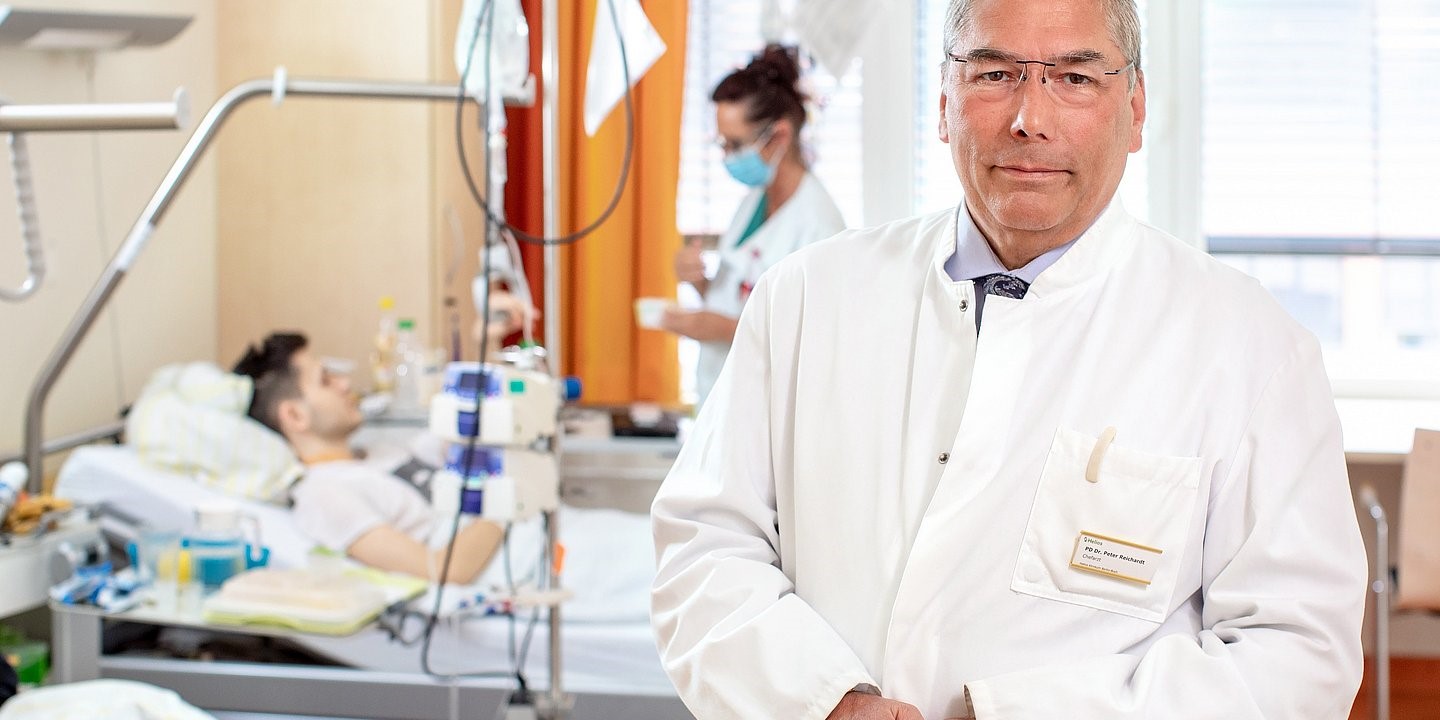
Colorectal cancer chemotherapy
In many patients, chemotherapy is a method complementary to surgery. This is the most important treatment option for patients with advanced colorectal cancer.
Chemotherapy: what does it mean?
'In oncological medicine, chemotherapy is a drug therapy with cytostatics aimed to destroy cancer cells. They interfere with the cancer cell cycle and inhibit tumour growth,' says Dr. Nicole Schinwald, Senior Physician of the Haematology, Oncology and Palliative Medicine Department at the Helios Amper Clinic Dachau. Cancer cells have a high division rate and therefore are especially sensitive to cytostatics. Chemotherapy is aimed to slow the tumour growth or stop it completely.
What are cytostatics?
Cytostatics are plant-derived and/or synthetic substances. They inhibit cell division and prevent replication and growth of rapidly dividing cells by affecting their metabolism. As they only have an effect on active cells, i.e. the cells being divided, cytostatics are used for cancer treatment.
"From the viewpoint of cancer treatment, chemotherapy is a drug therapy with cytostatics aimed to destroy cancer cells. They interfere with the cancer cell replication cycle and inhibit tumour growth."
Dr. Nicole Schinwald, Senior Physician of the Haematology, Oncology and Palliative Medicine Department at the Helios Amper Clinic Dachau
How do chemotherapy drugs work?
While local therapeutic measures such as surgery or radiation therapy are only targeted at specific body areas, the effect of cytostatics is relatively nonspecific and targets all cells throughout the body. The frequently divided cells are especially affected.
Therefore, the effect of cytostatics is also targeted at other healthy cell types that are rapidly replicated, e.g., in the bone marrow, hair, skin or mucous membranes. This is the main cause of known adverse effects such as hair loss or inflammation of the oral mucosa. Cytostatics do not distinguish between malignant and healthy cells, but attack them all.
Therapeutic or palliative chemotherapy
Colorectal cancer can be divided into four disease stages. The disease stage is an indicator of which goal to strive for.
Therapeutic therapy: a therapeutic approach can ensure a chance of complete recovery of the patient. The aim is to destroy all cancer cells, whenever possible, and achieve a complete cure.
Palliative therapy: palliative chemotherapy is performed at an advanced stage of the disease, when the destruction of all tumour cells is impossible. The aim is to slow down the disease progression. The palliative approach is focused on alleviation of some complaints and prolongation of a patient's life.
Adjuvant or neoadjuvant chemotherapy
Chemotherapy can also be combined with other treatment options. Whenever possible, the surgeon attempts to remove the entire tumour.
Adjuvant therapy: an adjuvant approach is applied after surgery to target cancer the cells that may have remained in the body after surgery but cannot be detected. This approach helps preventing the risk of recurrence.
Neoadjuvant therapy: a neoadjuvant approach is less common. If the tumour is too large to be removed during surgery, it is used before the surgical intervention, so that to remove the lesion during the intervention. Chemotherapy often reduces a tumour size, which improves the conditions of work.
Dr. Schinwald explains: 'Adjuvant chemotherapy is also used to treat colorectal cancer. After surgical treatment of the primary tumour, chemotherapy is given for 3–6 months to reduce the risk of recurrence.' Adjuvant therapy is particularly useful for treating patients at a high risk of metastases, for example, when the lymph nodes are already affected, the primary tumour has caused intestinal obstruction, or urgent surgery is required.
"The approved chemotherapeutic agents are equally effective for colorectal cancer. Depending on the possible adverse effects of the combined chemotherapy drugs and the tumour biology, a decision is made on the substances to use first."
Dr. Nicole Schinwald, Senior Physician of the Haematology, Oncology and Palliative Medicine Department at the Helios Amper Clinic Dachau
What substances are used for chemotherapy?
There are a number of cytostatics that have been successfully tested and proved to be effective in the treatment of colorectal cancer. They are often used in the combination therapy, often with antibodies, to control tumour.
'There is a golden standard in oncology: it is always necessary to find the most effective medicine in the first place,' says Dr. Schinwald. She adds, 'The approved chemotherapeutic agents are equally effective in colorectal cancer. Depending on the possible adverse effects of the combined chemotherapy drugs and the tumour biology, a decision is made on the substances to use first.'
Chemotherapy of colorectal cancer
As soon as colorectal cancer is diagnosed and established how much the cancer has developed or spread, the next treatment steps are discussed with the patient.
When is chemotherapy appropriate for colorectal cancer?
Chemotherapy is a complementary treatment for surgery in many colorectal cancer patients. If the disease is very advanced, chemotherapy will be the most important stage of treatment. However, whether cytotoxic drugs will be used for treatment of colorectal cancer patients depend on the disease stage. The tumour site also plays an important role, especially when surgery is part of the therapy.
| Disease stage |
Form of therapy |
| I: Cancer has spread to the second and third intestine layers and the muscle layer | • The tumour can be removed endoscopically or surgically. |
| II: Cancer has spread to surrounding tissues outside the intestines |
• colon cancer: surgical removal; • rectal cancer: complimentary neoadjuvant radiation and chemotherapy. |
| III: Cancer cells have invaded the surrounding lymph nodes |
• colon cancer: surgical removal; adjuvant chemotherapy; • rectal cancer: complimentary neoadjuvant radiation and chemotherapy |
| IV: Cancer gave distant metastases |
• as the case may be, surgical removal of all tumour regions, if possible; • where appropriate, palliative chemotherapy or radiation therapy to treat metastases; • individual therapy plans as part of the tumour conference. |
Even if there are specific guidelines for the treatment of colorectal cancer, individual therapy planning for each patient as part of an interdisciplinary tumour conference is necessary and constitutes the international standard. The tumour conference consists of experts in various narrow fields and includes joint consultations on the therapy that is best suited for the patient.
Tumour conference
There are over 300 different types of cancer. Correct diagnosis and determination of appropriate therapy are critical for any treatment. To that effect, the experts regularly discuss the examination results at the interdisciplinary local and interregional tumour conferences and recommend the most optimal therapy. The conferences bring together experts from all fields who will be involved in therapy, which allows their knowledge and assessments to be included into an individual management programme.
If a team of doctors at the tumour conference decides on the necessity of complex surgery, they together with a patient make a decision to transfer a patient to the appropriate specialized cancer centre.
Is there chemotherapy in the tableted form for colorectal cancer?
Cancer therapy drugs are available in various dosage forms for intravenous, oral, subcutaneous or intramuscular administration. 'Intravenous drugs and less often oral drugs, and sometimes their combination, are most often used for the treatment of colorectal cancer,' says the oncologist.
Intravenous drugs: a patient receives chemotherapy through a direct infusion into a vein or through a PORT system. It is a permanent and safe access to the blood circulatory system, which is inserted under the skin and allows for connection from the outside.
Oral drugs: a chemotherapy drug can also be administered orally. Usually, these drugs are available as tablets or capsules. With oral administration, patients have fewer hospital visits and more freedom to manage their time in their daily lives.
Subcutaneous form: some patients receive active substance through injections into the subcutaneous fat, for example, in the abdomen or thigh.
Intramuscular form: in rare cases, the active substance is injected directly into the muscle as with vaccination.
"Before chemotherapy, functioning of vital organs, i.e. the liver, lungs, heart and kidneys should be checked."
Dr. Nicole Schinwald, Senior Physician of the Haematology, Oncology and Palliative Medicine Department at the Helios Amper Clinic Dachau
Colorectal cancer chemotherapy: the treatment course varies on a case-by-case basis
What preliminary tests are needed?
'Before chemotherapy, functioning of vital organs, i.e. the liver, lungs, heart and kidneys should be checked,' says Dr. Schinwald. For this reason, blood tests (liver and kidney function tests) and diagnostic tests (heart ultrasound, lung function) are performed.
Depending on the planned chemotherapy, special preliminary tests are required for the use of individual substances. For example, a hearing test can be done as some medications may worsen an already existing hearing loss.
How is chemotherapy given?
Chemotherapy is given at intervals, in the form of so-called courses, during which treatment phases alternate with treatment breaks. The patient receives cytostatics for one or several days depending on the general state of health, disease and therapy type. This is followed by a break. At this stage, the drug should have an effect and the body can recover from the adverse effects. Then a new course starts.
Chemotherapy: outpatient or inpatient?
Whenever possible, outpatient treatment is given to avoid hospitalization. The patient comes to the clinic in the morning for treatment and then can go home.
If the patient is bedridden or it takes too long to get to the hospital which is needed to be visited often, hospitalization will be advisable. The advantage is that the patient will be more closely monitored and medical experts will be able to react quicker to possible adverse effects.
'Especially at the beginning of chemotherapy, it may be a good idea to start inpatient treatment and continue it outpatiently if the patient tolerates therapy well,' says Dr. Schinwald.
Can chemotherapy combined with other forms of therapy?
Multimodal therapy: systemic chemotherapy for colorectal cancer is usually a combination of two or three cytostatics and antibodies. Multimodal therapy is a combination of chemotherapy and surgery and/or radiation therapy.
Antibody therapy: antibody therapy is one of the most important breakthroughs in tumour research. The antibodies recognize certain characteristics of cells and attach to them. As a result, they interfere with the metabolism of cancer cells.
Local therapeutic measures: a patient can achieve a good outcome with surgery, radiation therapy or microwave ablation combined with chemotherapy. Treatment planning is carried out as part of an interdisciplinary tumour conference.
Colorectal cancer chemotherapy-associated adverse effects
Since chemotherapy also affects healthy cells, adverse effects such as nausea, vomiting and hair loss are common, which many patients are afraid of. Adverse effects may occur within hours or days after therapy initiation. 'Modern substances that significantly reduce the attacks of nausea and vomiting allow us to successfully manage the adverse effects,' says Dr. Schinwald.
Hair loss: the most common adverse effect is still hair loss. The hair-covering of the head is usually affected, and less often that of the body. From a medical viewpoint, hair loss during therapy is not harmful as hair grows again after the therapy ends. Nevertheless, hair loss is a big psychological issue for many patients as it makes it clear that they are sick.
The approaches used to save hair such as a cold cap are usually not covered by health insurance and are often unpleasant, although success is not guaranteed,' says Dr. Schinwald.
An alternative might be the wigs as most expenses for them are covered by health insurance, or wearing a headscarf. 'Before hair loss begins, it is worth making an appointment with a hairdresser or wig maker. Hair starts falling in about two to three weeks after the first course of chemotherapy,' explains Dr. Schinwald.
Nausea and vomiting: anticancer drugs influence on patients differently, so the same dose of an anticancer drug may cause nausea of different intensity. To prevent nausea and vomiting, patients may receive drugs prescribed by their physicians to reduce these adverse effects.
At home, anti-nausea drugs and teas can also help managing nausea. If there is no improvement, it makes sense to call a doctor.
Non-specific adverse effects: non-specific adverse effects such as sluggishness, low performance, weakness and fatigue may also occur during treatment with cytostatics. Regular exercises up to the maximum allowable limit can help here. For example, walking or slow cycling.
If you experience these or other adverse effects, discuss them with your physician.
Diet: especially important during chemotherapy for colorectal cancer
According to Dr. Schinwald, it is important for patients to maintain their weight. This works best with the food that a patient enjoys. As taste sensations may change or decrease during chemotherapy, loss of appetite is common. Dr. Schinwald advises to consider individual preferences that trigger the appetite. In addition, the doctor recommends the following:
• eat the food that is tasty and you can tolerate well;
• make sure you drink enough liquids;
• in case of body weight loss, it is also needed to consume high-calorie nutritional mixtures (after consulting a doctor);
• fruit and vegetables should be peeled and steamed.
What should be paid attention to during chemotherapy?
Dr. Schinwald provides patients with the following helpful advice to protect the immune system during chemotherapy:
1. Practice daily personal hygiene to reduce the quantity of microorganisms on the skin;
2. If necessary, freshen and change dressings after personal hygiene;
3. Practice good oral hygiene, brush the teeth with a soft toothbrush and use mouthwash;
4. If you have fever or other signs of infection (cough, abdominal pain, burning sensation when urinating), see your doctor immediately: antibiotics may be required due to a weakened immune system;
5. Avoid contact with people with severe infections.
What is the success rate of chemotherapy for colorectal cancer?
The use of adjuvant chemotherapy after surgery to remove a colorectal tumour results in a significant reduction in the recurrence rate and increases the five-year survival rate.
Palliative chemotherapy can prolong the lives of many people with incurable colorectal cancer by several years due to many different therapeutic options, their consistent use and a combination with local therapeutic measures.
Who does cover the cost of colorectal cancer chemotherapy?
The relevant medical health insurance provider pays for all approved drugs for (neo)adjuvant and palliative therapy.
Colorectal cancer chemotherapy: life after chemotherapy
After completing adjuvant chemotherapy, regular follow-ups are carried out. Initially, four times a year for the first two years.
The therapy forms are chosen on an individual basis
Colorectal cancer treatment is very individual. The doctors at the tumour conference decide which chemotherapy and other therapeutic measures are most suitable and promising for the treatment of this disease. The medical advances make it possible to manage common adverse effects and even minimize them.
More information about Helios Amper Hospital Dachau













